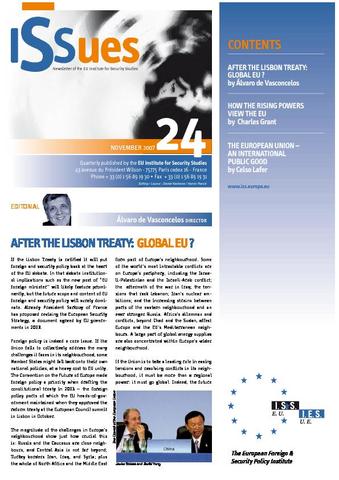You are here
After the Lisbon treaty: global EU?

If the Lisbon Treaty is ratified it will put foreign and security policy back at the heart of the EU debate. In that debate institutional implications such as the new post of “EU foreign minister” will likely feature prominently,but the future scope and content of EU foreign and security policy will surely dominate.
Already President Sarkozy of France has proposed revising the European Security Strategy, a document agreed by EU governments in 2003.Foreign policy is indeed a core issue. If the Union fails to collectively address the many challenges it faces in its neighbourhood, some Member States might fall back onto their own national policies, at a heavy cost to EU unity. The Convention on the Future of Europe made foreign policy a priority when drafting the constitutional treaty in 2003 – the foreign policy parts of which the EU heads-of-government maintained when they approved the reform treaty at the European Council summit in Lisbon in October.
The magnitude of the challenges in Europe’s neighbourhood show just how crucial this is: Russia and the Caucasus are close neighbours,and Central Asia is not far beyond; Turkey borders Iran, Iraq, and Syria; plus the whole of North Africa and the Middle East form part of Europe’s neighbourhood. Some of the world’s most intractable conflicts are on Europe’s periphery, including the Israeli- Palestinian and the Israeli-Arab conflict; the aftermath of the war in Iraq; the tensions that rack Lebanon; Iran’s nuclear ambitions; and the increasing strains between parts of the eastern neighbourhood and an ever stronger Russia. Africa’s dilemmas and conflicts, beyond Chad and the Sudan, affect Europe and the EU’s Mediterranean neighbours. A large part of global energy supplies are also concentrated within Europe’s wider neighbourhood.